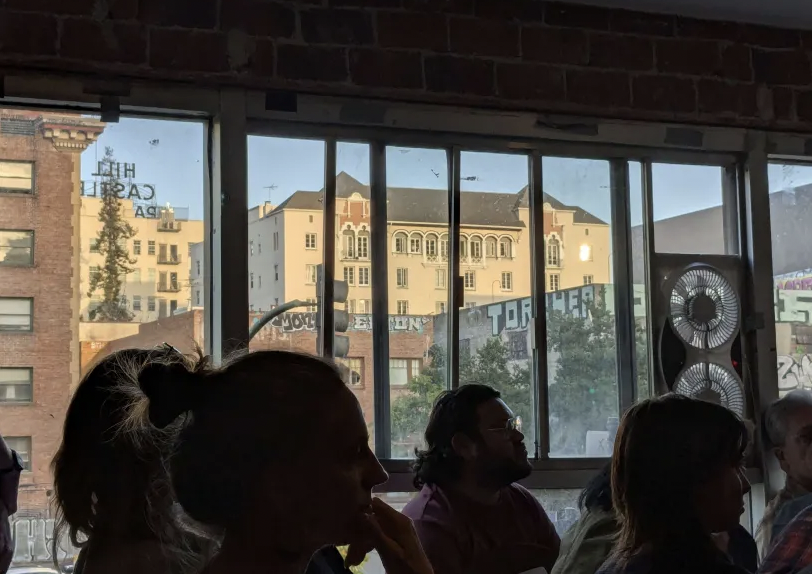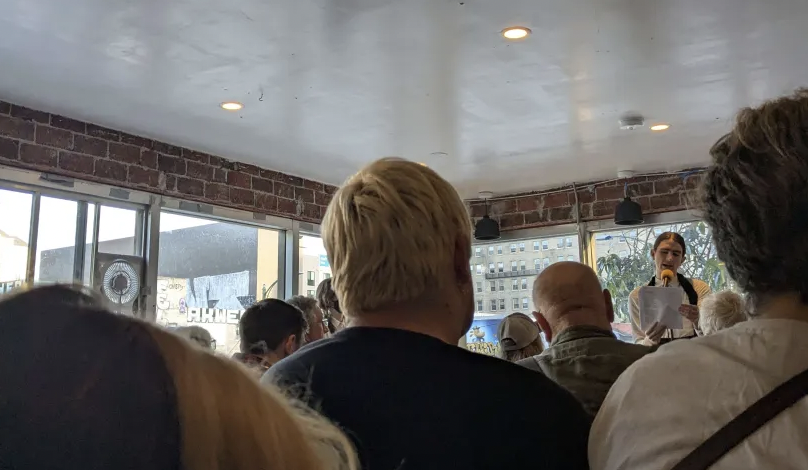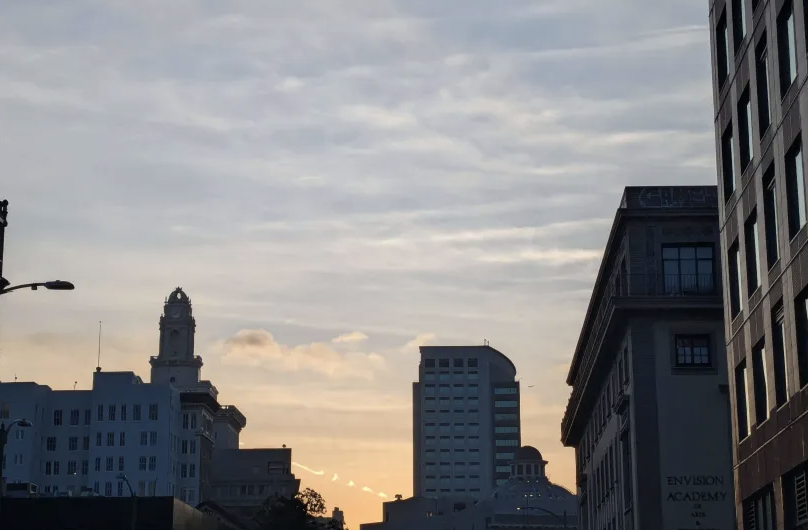We squeezed into the elbow of the stairs. We heard Juliana Spahr read words new to us after revisiting That Winter The Wolves Came that afternoon. We were behind a pink coat that might have been vintage Chanel or might have been a modern imitation. We heard lines cascade, incantatory, over the half wall and down the stairs.
Repetition was noted, and appreciated, as a structure.
We tiptoed up at the poet shift change and found another of us. We sat on the floor and stood on the stairs as Violet read An Obvious Poem. There were solid laugh lines, and an echo to the templated form of Spahr’s. We greeted Noor, met John, complimented Laura Moriarty on her always inspired assemblings of jewelry and scarves, and she was glad to have had a reason to dress up. We stood on the sidewalk in the dregs of a soft day and talked with poets about dragon books and board books and chapbooks. Two long poems... Followed by two cakes. We were listening. Then we sang.

I, on the other hand, know very little about contemporary poets, which means I can savor (or dislike) the poems at the readings my poet friends invite me to without knowing whether the poet is famous. At last night’s installment of the weekly Tamarack reading series, however, there were Signs. The top floor was completely packed, and more surprisingly the poets started on time. Eight minutes late (nearly an hour early by usual poet standards), I slipped sheepishly past the register without buying a drink, and took my place with the other fire code violators in a line halfway down the stairs, a special place to consume poetry. Only the tallest could see the speakers, the rest left to listen for words that slip over the bannister. I heard very little of Norma Cole’s opening number. The kitchen staff were easier to hear. Hey, do you know what the deal is with the washing machine? Will it be fixed soon? Another points out The machine isn’t turned on, you have to press the big button. On the stairs, we cope with the situation differently. One person (tall, but not tall enough) gives me a wry Doonesbury grin in silent camaraderie. Another (tall enough) is sketching the back of the heads closer to the speaker, and his notebook becomes my jumbotron, letting me watch the reading vicariously. Another is writing poetry on their phone; I know I shouldn’t look, but that’s what one does on the stairs, and I read “She had a boyfriend, of course.” Someone else is reading Norma Cole’s wikipedia page. Norma says “fuck,” loud enough that we can all hear it, and pleasant laughter breaks out. It’s a nice time.
With the social pressure not to look at my phone when a poem bores me, I sit with my naked thoughts, and it only streamlines the process that I can’t hear the poems. Juliana Spahr’s reading has lovely tones and urgency; I think the words are maybe about climate change. The final poet, Violet Spurlock, speaks with such bracing alacrity that the stairs caucus snaps our chins in her direction. She is completely at peace with her audience, which has at last coalesced into a cohesive unit of shared attention. Her poem is about obviousness, and her attempt to write a poem that is intentionally obvious, which is apparently harder than it sounds to do on purpose. I look to the guy who was writing what I thought was a pretty obvious poem on his phone to see if he feels similarly. He has already left. And then we must all leave the building and eat cake (one of two): it is Violet’s birthday! A metal band outside with all their gear on the sidewalk--they have a gig immediately afterwards--helps explain why the poets started on time. Scores of us stand on the sidewalk, seemingly thrilled about cake we’re not in any hurry to eat. Violet explains that they actually did start a little late because she went on a birthday hike this afternoon, but encountered a furious rattlesnake on their path down, and accordingly had to take a far longer route home. I feel guilty talking to her, like hogging the birthday girl at a birthday party. This is of course nonsense, but sometimes the vibes at a party are good enough to trigger sinful overindulgence, so I abscond to a nearby karaoke bar, where the vibes are bad, to atone and restore balance.

Your third correspondent arrived at Tamarack in time to order a negroni and stash her purse on a chair; but after greeting and hugging the people one greets and hugs before a poetry reading, found the chair appropriated and ended up sitting seiza on the floorboards at the back of the room, contemplating the brickwork over the windows while an invisible Norma Cole read at front. By the time Juliana Spahr took over with a poem on plankton, the cocktail was buoying up the oceanic imagery and easing the knee pain. Violet Spurlock's long poem on obviousness started with generalities and funneled inward to thoughts on body hair; afterward, on the sidewalk, Violet talked with your correspondent about the difference between the obvious and the apparent, and how so much of gender transition is simply a job of negotiating those qualities all the damn time. “What was interesting to me is, in the early modern period, the obvious is a term for what’s immediately present to the senses. But a couple centuries later, it’s a matter of concepts, what any reasonable person–that legal term–could be expected to deduce.” We closed with “Happy Birthday” on the sidewalk, a metal band doing their soundcheck upstairs, and a parting commiseration on electrolysis, which obviously, negroni or no negroni, always hurts like hell.

